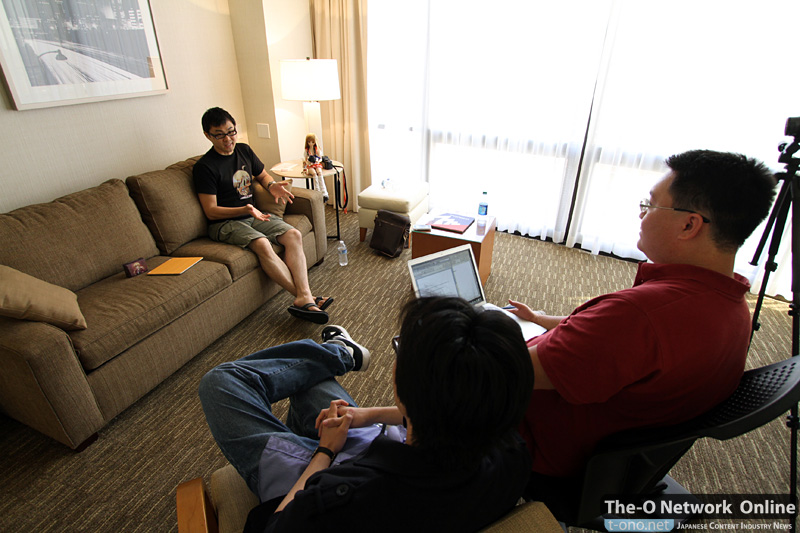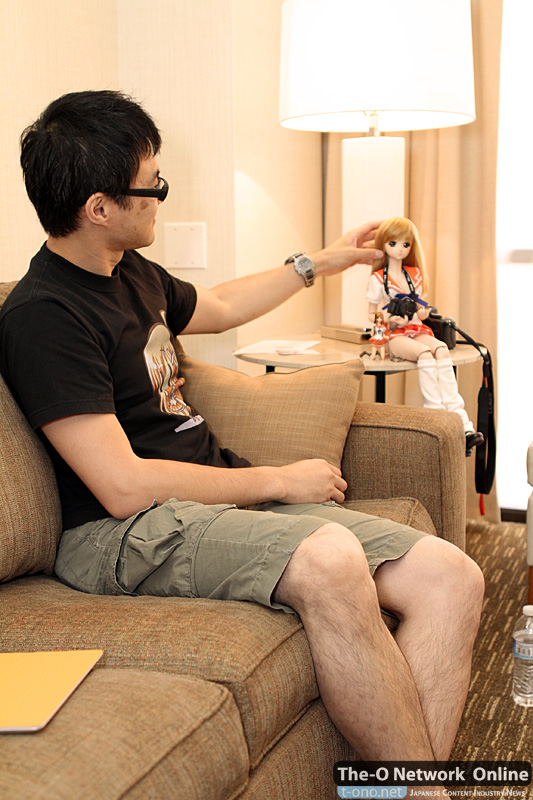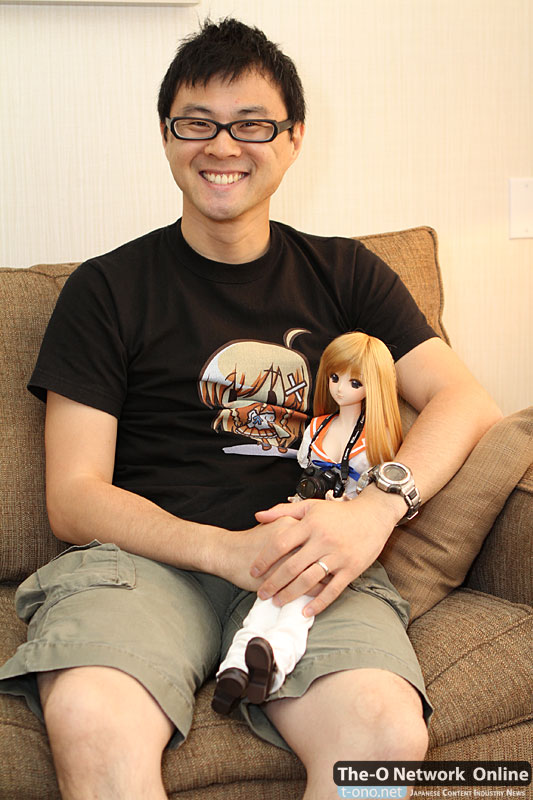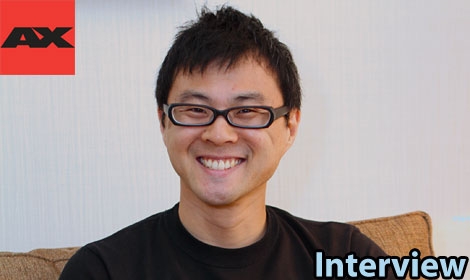This year was North America's largest anime convention, Anime Expo's 20th anniversary. To celebrate, the convention decided to bring back some of it's more popular guests and otaku blogger Danny Choo was one of them. It's been a year since we last interviewed him (you can read our past interview here), hear what's it like for an otaku blogger who is now an entrepreneur working with some of the biggest names in the business!
T-ONO: So how is your stay so far?
Choo: Ah, it's been nonstop! [laughs] It's been nonstop since I've left Japan, it's been nonstop since I arrived from Japan.
T-ONO: Seems like you've been a busy man!
Choo: [laughs] It's good to keep busy I guess!
T-ONO: Since the last time we saw you, how do you think your business has changed?
Choo: Hmm... it's definitely changed a lot. I think, last year in 2010, many companies were recovering from losing lots of money from 2009. And then, especially towards the end of last year, many clients suddenly started to require my services which is to share Japanese culture with the world. So since then, companies like Ascii Media Works, King Records, Bushiroad, Sega, Konami, they've all jumped on board which is kind of overwhelming. I mean it's great, because I get to do stuff with anime and games, so it's like work and play at the same time.
T-ONO: That's great to hear. How did the earthquake and tsunami impact business?
 Choo: I think once the earthquake hit, many folks weren't sure what was going to happen. Were the blackouts going to continue? Were people going to get food? You know there were just so many uncertain things, but I think that the Japanese folks remained very calm, and they are generally very well behaved. That really helped society get back on its feet again, and there's lots of folks helping out with the relief effort as well. But during that period of uncertainty, many businesses, who I spoke to as well, felt that their clients were not contacting them anymore, because their clients just didn't know what was going on basically.
Choo: I think once the earthquake hit, many folks weren't sure what was going to happen. Were the blackouts going to continue? Were people going to get food? You know there were just so many uncertain things, but I think that the Japanese folks remained very calm, and they are generally very well behaved. That really helped society get back on its feet again, and there's lots of folks helping out with the relief effort as well. But during that period of uncertainty, many businesses, who I spoke to as well, felt that their clients were not contacting them anymore, because their clients just didn't know what was going on basically.
I definitely saw a danger. I think it opened up people's minds to really start thinking about, like a contingency plan to support the business. Some businesses actually set up offices in other locations like in Osaka. One of my clients, they have offices in Tokyo, but they also have offices in Osaka. So if something hits Tokyo, then Osaka would continue the job. There's companies who started up operations overseas and started to think about the overseas market. So if anything happens in Japan, you know, businesses still continue overseas.
T-ONO: We've seen the before and after pictures and it's amazing to see how quickly Japan can turn around and get back on their feet. In recent years, the American market in the anime industry has declined. We've noticed there's been a sudden resurgence in the last year, for example here at Anime Expo, we have all these Japanese companies present. Could this stimulus partially be due to the earthquake?
Choo: I mean the earthquake happened only a few months ago, so like I wouldn't say it's because of the earthquake. I would say that it's a change in thinking, a more open mind, into thinking what businesses in Japan can do to get back the costs of producing anime for example. I think it's a good thing. So one of the things my clients, who are anime companies and figure companies, came up with was some sort of a system that helps Japanese companies manage licenses and manages logistics and distribution as well. To enable products like physical media to folks overseas much more quickly.
T-ONO: Most of your works are based heavily in Japan. Are there any plans to expand worldwide out of Japan?
Choo: So I plan to die in Japan. You never know when you're going to die, I could go outside and someone could like shoot me, steal my Yuki from me! [jokingly] That'd be really bad.
I think my job description is going to stay the same. But at the same time, all the things I want to do this year, I want to start manufacturing my own products. I mean it's always been in the pipeline, but the timing has never been right. So one of the things I'm doing is offering Japanese lessons through my mascot characters. The first set of products will be a bunch of cards, like Hiragana cards basically. So those illustrations are done by somebody called Ikyuu-sensei. His illustrations can be used on many products like t-shirts and bags and so on, so that's one thing. And I've got my plans for a wide range of products as well that can be sold worldwide.
T-ONO: We've noticed that Saber is not with you, but Yuki is. Can you tell us a little bit about Yuki?
 Choo: So I've always been a fan of Yuki, she's just really cute. But it's really hard to get a hold of Yuki. And because I couldn't get a hold of one, I just tried to ignore the fact that she, you know, existed. Then I was in Shanghai last month and I was surrounded by them! I was like "oh my god no more!" So I pulled a few strings and managed to get a hold of her! So I've been thinking, who do I like more? Do I like Saber more? But I don't know, she just ended up coming along me [laughs].
Choo: So I've always been a fan of Yuki, she's just really cute. But it's really hard to get a hold of Yuki. And because I couldn't get a hold of one, I just tried to ignore the fact that she, you know, existed. Then I was in Shanghai last month and I was surrounded by them! I was like "oh my god no more!" So I pulled a few strings and managed to get a hold of her! So I've been thinking, who do I like more? Do I like Saber more? But I don't know, she just ended up coming along me [laughs].
T-ONO: Has there been any changes for your web platform?
Choo: So Mirai Gaia would always be a tool to enable me to assist my clients in sharing and disseminating information about their products and services. At the moment there are no plans for it to be licensed. I have quite a few brand names such as Sega, Kadokawa, King Records, Good Smile Company, and Bushiroad. I'm currently working on a website for Konami right now, so I'm very excited about that. Once you have these names using your platform, I guess it is easier for other companies to adopt the use of the platform. So for the time being, we'll continue to upgrade the features, especially mobile usage, I mean there's an iPhone version, but we need to continue to upgrade functionality.
T-ONO: We know that the first season of your television show, Culture Japan, is coming to the United States and a lot of fans have already seen it. Can you tell us about season two?
Choo: So for season two, one of the first things I'm going to do after I get back to Japan is to head up North to Tohoku, where the most damaged part of Japan is. I think we're going with a volunteer body called Peace Boat, they've done lots of volunteer work in the region, and we'll be covering relief efforts going on there. Because the show is about otakus and Japan, we want to cover otaku type companies and what they're doing to help the relief efforts. So it's going to be things like that, it's going to be more behind the scenes at anime studios, behind the scenes of how dolls are made, how figures are made, and so on and so forth. So, pretty much more of the same, sprinkled with more, uh, nitty gritty details!
T-ONO: So you're hosting a lot of panels?
 Choo: Yeah, so I've got my own panel tomorrow night. And then I'm doing the Starchild voice actress one, I'm doing a lot of things. [laughs] I also have my own booth in the exhibition hall. It's going to be running itself.
Choo: Yeah, so I've got my own panel tomorrow night. And then I'm doing the Starchild voice actress one, I'm doing a lot of things. [laughs] I also have my own booth in the exhibition hall. It's going to be running itself.
T-ONO: Running itself?
Choo: [laughs] You'll see what I mean!
T-ONO: Thank you for the interview.
Choo: Thank you!

